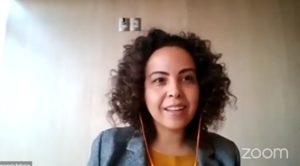São Paulo – Brazil has worked to take its agriculture and livestock to new levels of innovation and is willing to share its experience with Sudan, an Arab country that is seeking to grow in the sector. Brazil’s Agriculture, Livestock and Supply (MAPA, in the Portuguese acronym) executive director Cleber Soares (pictured above) presented during an online event the pillars of an agenda that the ministry has developed to drive the segment forward. “We’re ready to share it with you,” he told the Sudanese after mentioning some measures that have been implemented.
The webinar “Sudan: Technologies and Business Partnerships Opportunities for the Brazilian and Sudanese Companies” addressed the business opportunities between Brazil and Sudan and was hosted by the Arab Brazilian Chamber of Commerce (ABCC) in partnership with the Afro-Brazilian Chamber of Commerce (AfroChamber). The event featured Brazilian and Sudanese lecturers and brought some 400 people together from the two regions. The debates were moderated by ABCC Institutional Relations manager Fernanda Baltazar.

Soares said the efficiency gain in Brazilian agribusiness in the last years has occurred mainly due to technology. But the MAPA’s director believes the global agribusiness is facing a population increase. The world has now seven billion people and could reach up to nine billion by 2050, which is expected to generate a higher demand for foodstuffs. “The agricultural world will have to produce in an increasingly efficient, sustainable, resilient manner,” he said.
Based on these principia, MAPA has developed an innovation agenda with five pillars. One is sustainability, which includes carbon currency, soil and water use, dealing with the climate component, and others. Bioeconomy is another pillar and includes advanced biology, gene editing, new ways of doing farming, bio-based resources, and bioenergy. Another front is digitizing the field by using new virtual learning models and greater connectivity.
The agenda entails working for open innovation, which is the development of new agricultural systems and fostering agritechs, which are startups focused on agribusiness, for example. In 2019, Brazil had 1,125 agritechs, and last year this number climbed to 2,400 of such companies, Soares said. There’s also a front for food tech focused on adding value and developing new ingredients, processes and products in agribusiness.
Soares mentioned the achievements of Brazil in these fields such as biological nitrogen fixation in soil, which will be used on 42 million hectares in the country during the 2020-21 summer crop, and the integrated-crop-livestock system, which cover 17 million hectares. “In the same area you can produce, for example, maize, soy, beef or milk, and forest. This is a revolution when it comes to Brazilian agriculture, and we can transfer this knowledge, this expertise, with African countries,” said the director. In biological nitrogen fixation, the process is carried out by microorganisms.
More nutrient-dense foods to fight hunger

State-run agricultural research agency Embrapa researcher Marília Regini Nuti also spoke during the online event and told the Sudanese about the Brazilian work on biofortification of crops to fight the global food insecurity.
The process involves an increase of the nutritional features of the plants, but instead of adding nutrients to the product during processing, nutrient-denser plant cultivars are developed. Nuti said two billion people around the world suffer from hidden hunger, which is the deficiency of micronutrients such as iron, zinc, and provitamin A.
Brazil carries out this work within a larger world alliance called HarvestPlus, a global effort to end hidden hunger, and is currently devoted to increasing the micronutrients in pumpkin, rice, beans, cowpeas, cassava, maize, sweet potato, and wheat. According to Nuti, 13 cultivars have been registered by MAPA and are being produced across the country, and 200,000 people consume the products that have been biofortified in Brazil.
The webinar featured the president of the ABCC, Osmar Chohfi; Brazil’s ambassador to Kartoum, Patrícia Lima; chargé d’affaires at the Embassy of Sudan in Brasília, Mohammed Elrashed Sidahmed; president of the AfroChamber, Rui Mucaje; manager of the African Development Group Bank, Raubil Durowoju; and Agricultural Technology Transfer director of CTC Group Mamoum Dawelbeit. ABCC Marketing & Content director Silvana Gomes made a speech in the end of the webinar and presented a novelty of the ABCC’s news agency ANBA, which will start publishing articles.
Read more news about the webinar:
From mining to agriculture, Sudan seeks investment
Ten opportunities for companies in Sudan
Watch the full event on YouTube:
Translated by Guilherme Miranda




